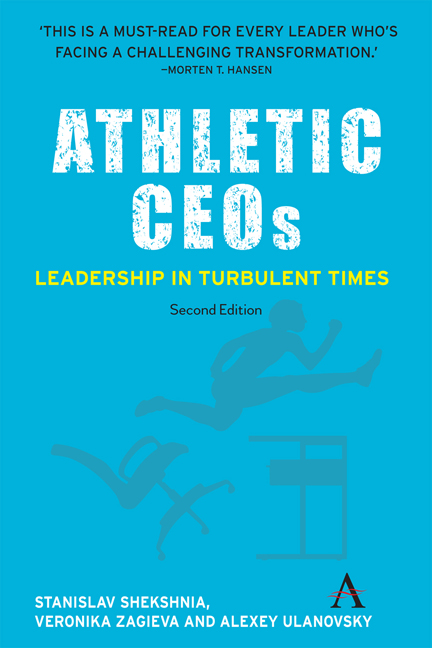Book contents
- Frontmatter
- Contents
- List of Illustrations
- Introduction to the Second Edition
- 1 Athletic Leadership Explained
- 2 The Agenda and Practices of Athletic Leaders
- 3 Effectiveness of Athletic Leadership: Outputs and Outcomes
- 4 Vitaly Saveliev: Passion and Innovation at the Old Airline
- 5 Eugene Kaspersky: Saving the World
- 6 Alexander Dyukov: Quiet Transformation of Gazprom Neft
- 7 Herman Gref at Sberbank: Entrepreneurship in the Least Likely Place
- 8 Athletic Leadership in Other Regions: Roger Agnelli, Dong Mingzhu and Jeff Bezos
- 9 Athletic Leadership for Non-Athletes
- Appendix: Research Methodology
- Index
2 - The Agenda and Practices of Athletic Leaders
Published online by Cambridge University Press: 04 October 2019
- Frontmatter
- Contents
- List of Illustrations
- Introduction to the Second Edition
- 1 Athletic Leadership Explained
- 2 The Agenda and Practices of Athletic Leaders
- 3 Effectiveness of Athletic Leadership: Outputs and Outcomes
- 4 Vitaly Saveliev: Passion and Innovation at the Old Airline
- 5 Eugene Kaspersky: Saving the World
- 6 Alexander Dyukov: Quiet Transformation of Gazprom Neft
- 7 Herman Gref at Sberbank: Entrepreneurship in the Least Likely Place
- 8 Athletic Leadership in Other Regions: Roger Agnelli, Dong Mingzhu and Jeff Bezos
- 9 Athletic Leadership for Non-Athletes
- Appendix: Research Methodology
- Index
Summary
The purpose of training is to tighten up the slack, toughen the body, and polish the spirit.
– Morihei Ueshiba, Aikido founderYou miss 100% of the shots you never take.
– Wayne GretzkyLeadership Agenda
The goals and objectives of each athletic leader are highly specific – and to a large degree determined by the company they lead and the industry it operates in. Alexander Dyukov wants Gazprom Neft to be the best in class in terms of operational efficiency and health, safety and environmental (HSE) protection. Vitaly Saveliev strives to make Aeroflot one of the top 20 airlines by number of passengers and the most profitable in terms of return on equity. Herman Gref is building a digital organization that will provide a whole range of services to hundreds of millions of private and corporate customers, including banking. Yet there are some striking commonalities in their leadership agendas: the ambitions and major themes that guide their leadership action.
The agendas of athletic leaders are complex and multidimensional, with many different overarching themes, time horizons and specific projects. However, there are two central leitmotifs in all this diversity: winning and transforming(see Table 2.1).
Like top-performing athletes, athletic leaders are determined to win. We will see later how this goal (or, rather, attitude) translates into specific leadership practices. For now, it is enough to note that these leaders are very competitive and want to win on multiple fronts. First, they want to beat specific competitors – companies and leaders that they recognize as such. Some are open about this, while others keep the names and criteria to themselves, but they all have such rivals – which may not necessarily come from the same industry. In fact, some of our protagonists compete with each other. One of their deputies told us, ‘Sberbank is both a benchmark and a rival for us. Our boss constantly follows up on what's going on there and feels good when we do something better.’
Second, athletic leaders work hard to beat their own records. They want their companies to constantly outperform themselves. Vadim Yakovlev, vice president at Gazprom Neft, says, ‘Dyukov sets the bar higher and higher for himself and the organization, even if market conditions or the board of directors do not require that to happen.’
- Type
- Chapter
- Information
- Athletic CEOsLeadership in Turbulent Times, pp. 41 - 66Publisher: Anthem PressPrint publication year: 2019



